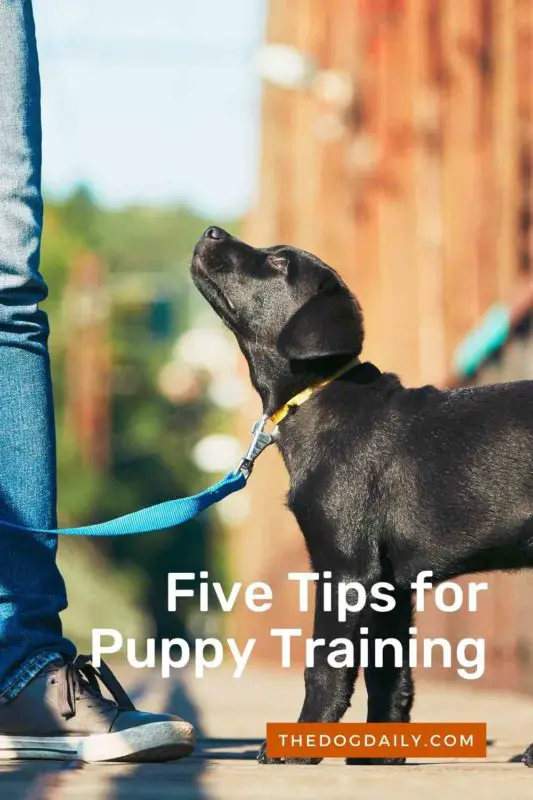Puppy Training Tips and Tricks
Bringing home a new puppy is an exciting time for the entire family! Between cuddles, games, and treats for the new dog – there is lots of fun to be had. However, don’t forget about obedience training for the puppy. Just as important as food, shelter, and love, puppy training is an integral part of raising a puppy. Through effective training, you can prevent destructive behaviors, and you can raise your puppy to become the best dog companion for you and your family.
Start Puppy Training Early
Dog training should begin the moment your puppy joins your family. Young puppies are like sponges; they are constantly soaking up new information and are eager to learn.
So take advantage of their enthusiasm to teach them acceptable behaviors and boundaries early on.
Puppy training is all about communication. The general idea is to teach your dog to listen to your commands and follow them accordingly. It goes both ways – by investing time in obedience training, you will learn to better understand your dog and read your dog’s body language’s nuances. Effective communication makes puppy training a great way to bond with your puppy. If you are unsure where to start, begin the basics such as teaching your puppy to come when called, sit and stay, and loose leash walking.
As your puppy grows and learns to navigate the world around him, you might run into unwanted behaviors like biting or chewing. Stay calm, as a misbehaving puppy is often a bored puppy who does not know how to channel energy appropriately. If your puppy is engaging in destructive behaviors like chewing, barking, or biting, avoid scolding your puppy. Instead, work on fixing the issue through redirection, increasing exercise time, more socialization, or teaching an interrupt command, such as ‘Stop’ or ‘No.’
Puppy training is an excellent way to keep your young dog mentally occupied and physically active. Learning new tricks gives them something to focus on and provides fulfillment to dogs who naturally love to please their owners. Apart from training, here are seven other ways to keep your puppy occupied, especially during a lockdown.
Five Tips for Puppy Training
Now that you know how important it is to start training your puppy, here are a few tips to try and up your puppy training game.
1. Keep Puppy Training Sessions Brief
Puppies have short attention spans. Set your puppy up for success by keeping training sessions quick and straightforward. Teach one command for a few minutes at a time, and repeat the same training later in the day. Avoid prolonged training sessions as the puppy may lose interest and view training as a tedious chore.
2. Give Rewards To Your Puppy
Training sessions should be a fun and happy activity that your puppy looks forward to. Avoid punishing your puppy for not understanding commands as puppies are known to respond better to positive reinforcement. Instead, end training sessions on a positive note by showering your puppy with praise or offering a treat. Once your puppy masters a command, start to wean him off the treats gradually so that a treat is not expected every time your puppy follows instructions.
3. Consistency Is Key
To truly master their training, puppies need practice. Be patient with your puppy and repeat training sessions consistently and frequently. Try not to skip puppy training on busy days. Instead, set aside time every day to train your puppy and make it a priority. An obedient puppy is likely to grow up into a well-trained dog, making time spent on puppy training an investment for your dog’s future.
4. Get Everyone Involved
While you may be the primary owner of a puppy, dogs are very much pack animals. They need to feel like they are part of the family and perform best if they know their position in the pack. To help establish pack placement for your puppy, everyone at home needs to participate in the training. Teach your puppy to listen to other members of the family as well, not just yourself.
5. Consider Puppy Training Classes
New pet owners trying to train an energetic puppy that won’t sit still can feel overwhelmed. Consider professional puppy training classes. Having an expert demonstrate training methods can be constructive and enlightening if you are unfamiliar with dog training. Plus, classes allow your puppy to meet other dogs and improve their social skills. It also gives you a chance to meet with other new puppy parents. When deciding on a prospective training school, consider choosing one that uses positive reinforcement strategies, and only accepts vaccinated dogs.
Treats During Puppy Training
If you have a food-motivated puppy, giving out some yummy snacks as rewards can motivate your dog and bring about fast progress. However, do take care to keep treats healthy. The last thing you need is to have a well-trained puppy with health problems due to being overweight. Treats should not make up more than 10 percent of your dog’s total daily calories to maintain a nutritious diet.
One healthy treat that most puppies love are fruits such as blueberries and apple slices. Be careful, though, as not all fruits are safe for dogs. Grapes, for example, are one of these. These sweet morsels are delectable to humans, but grapes are downright dangerous for our canine family members.
Socializing Your Puppy
Socialization is an essential part of puppy training. Proper socialization from an early age can go a long way to prevent dog behavior problems that may persist well into adulthood. To socialize your puppy, expose him or her to different smells, sights, and sounds.
Always make the experience a positive one and give treats or praise if needed. This way, your pup has a good chance of growing up into a confident and relaxed adult dog that remains calm in various situations, places, and people. The best time to socialize your puppy is from 3 to 12 weeks. From 12 to 18 weeks, it becomes gradually more difficult for your puppy to be comfortable in unfamiliar surroundings. After 18 weeks, it can be quite challenging, although not impossible, to acclimate your puppy to new situations.
To sum it all up, puppy training is crucial for a happy and healthy dog. Start young, go slow, be patient, and get professional help if you need to. Dog training is an activity that requires time and effort from the dog owner, but it is well worth it.





